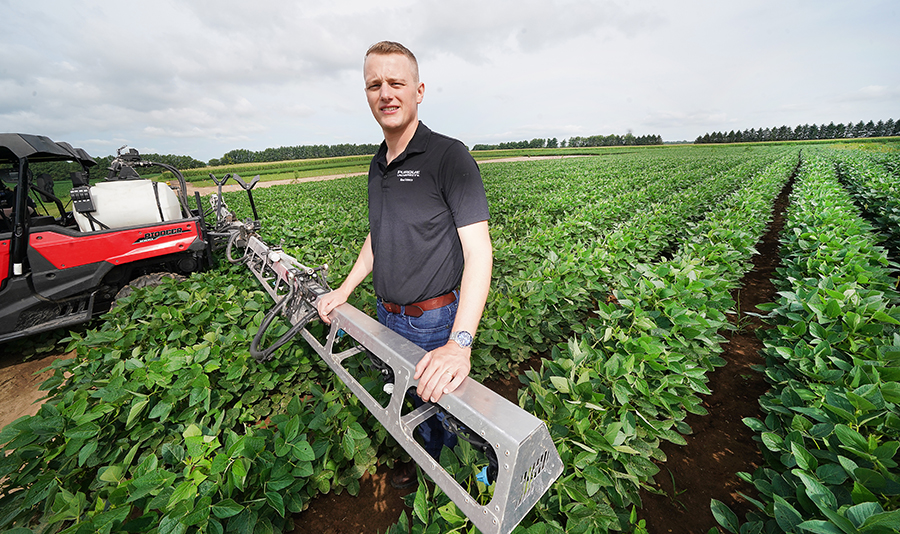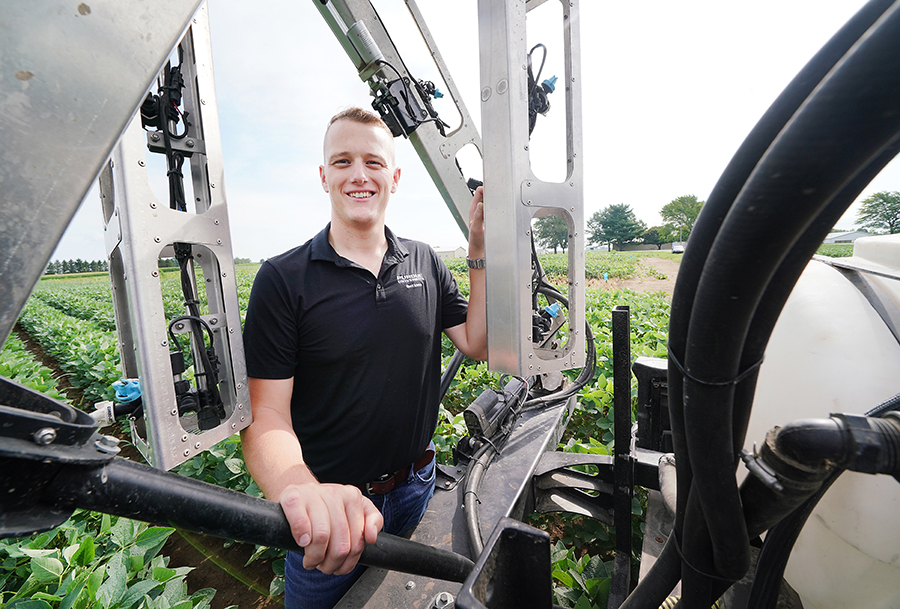Jesse Haarmann
When you’re doing good research, you should learn new knowledge. With resistance evolution and new issues related to climate, we have novel problems that we need to solve.
- Jesse Haarmann, PhD student, Botany and Plant Pathology
The student
When Jesse Haarmann arrived at the University of Illinois, he had every intention of taking his bachelor’s degree in crop sciences back to his hometown of Effingham, Illinois, where his family farms corn and soybeans and raises pigs. But then Haarmann discovered his interest in research and decided to go one degree further. “I looked at the ag industry and thought about what I wanted to do, and I liked what agronomists were doing,” he says. He asked people he knew in industry to recommend graduate programs with strong research components and that produced skilled graduates. He reached out to faculty members at the recommended universities and chose Purdue in 2017 for its facilities and resources, and the botany and plant pathology department for its pragmatic approach to agronomy: “I liked the applicability,” he explains. After completing his master’s degree in weed science in 2019, he surprised himself again by staying on for doctoral study, continuing under the guidance of Bill Johnson, professor of weed science and Extension for agronomic crops. “I thought I’d get my MS as quickly as I could and then go out and get a job,” Haarmann says. “But I took a liking to the research.”
The research
“I study a group of herbicides called PPO inhibitors in a weed called waterhemp, which is resistant to PPO herbicides,” Haarmann says. More specifically, he is looking at the effects of trifludimoxazin, a PPO-inhibiting herbicide under development on PPO resistance selection in the field. His work involves applying herbicides in the field, collecting the plants that come up, and extracting DNA to study their genetic makeup as well as gene sequencing of greenhouse plants grown under controlled conditions. By comparing different resistant populations from around the Midwest — plants of the same species but varying genetically — Haarmann hopes to better understand the mechanism of PPO resistance and predict the herbicide’s future impact in the field. “I like integrating the applied and the basic side of things and explaining the applied science with theoretical knowledge,” he says. “I get to see the whole picture.”
Opportunities
The Johnson lab conducts research for a wide range of stakeholders, Haarmann says. This has given him opportunities to speak to growers and industry representatives at Purdue Extension field days, write an Extension publication based on his master’s degree research, and speak at meetings of the Weed Science Society of America (WSSA) and North Central Weed Science Society. His advisor allows him to explore his own areas of interest, Haarmann adds. “I have a lot of room to do the type of research I want to do, while on the advising side, we’re making sure things make sense and are complete and well designed.”
Future plans
After Haarmann completes his PhD in May 2023, he will look for a product development role in industry. “I’d like a career as a field biologist in crop protection, testing new herbicides,” he says. The market looks promising, he adds, and while he likes the Midwest, he’s flexible on where he might end up. In his spare time Haarmann enjoys vegetable gardening, reading and trying out local varietals with his wife at Indiana wineries.